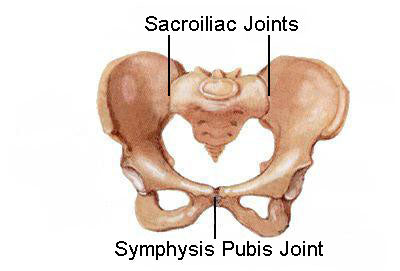What is PGP in pregnancy and what can you do about it?
Share
 PGP (pelvic girdle pain) in pregnancy
PGP (pelvic girdle pain) in pregnancy
If you're walking like a penguin while pregnant, it's probably not because you're attention seeking but because you suffer from PGP (Pelvic Girdle Pain).
The reason for your pain is that your placenta is producing a hormone called Relaxin. To prepare your body for birth, Relaxin makes your body's soft tissue softer and more stretchable than normal.
Why is Relaxin causing me pain?
Your joints get looser, your muscles relax more (even your skin gets softer, who knew!?) and some of your joints that don't normally move a lot, like your pubic bone and sacroiliac joints (think of a literal pain in your butt) loosen up and rub together when you move. OUCH!
You can actually get PGP at any time in your pregnancy and it can keep bugging you for a long time after the birth. Don't worry though, for most women it only takes a couple of months after birth to get back to normal. Please note that PGP has absolutely nothing to do with your fitness level before you got pregnant. Even athletes can get PGP.
If you have PGP (it's actually also called SPD (symphisis pubis dysfuncion) you have to make sure you take care of your body, move correctly and get plenty of rest.
PGP in pregnancy can have a huge impact on your life
If your PGP in pregnancy is causing severe pain and having a big impact on your life in a negative way, seek help and support and please don't overexert yourself. Some movements are worse than others, like cleaning or mopping the floors, so make a note of which movements affect you badly and try to avoid them.
Speak to a midwife or doctor and see if you can be referred to physiotherapy.
A physiotherapist (try to find one who's knowledgeable about PGP) should give you instructions on how to move, sit and stand correctly, get out of bed etc. Some of them will try to ease your pain by applying heat, massaging or teaching you exercises that help.
If you possibly can, try to do less housework. Any movement that twists your pelvis will cause pain, so things like mopping, pushing a shopping cart, walking up and down stairs and getting in and out of a car are pretty bad.
What to do to ease the pain and get some relief?
- Any physiotherapist or midwife who knows about the benefits of a maternity slide sheet will recommend you get one. Seriously. According to Icelandic research, out of any mobility aid provided for pregnant women who suffer from PGP, the majority said a maternity slide sheet helped them the most. (Heiðarsdottir & Gudbjornsdottir, 2004). I've personally used a Snoozle maternity slide sheet for 3 pregnancies and heard countless tales from other women about how much it helped them. It's not a miracle cure for PGP, but for those excruciating movements during the night, it's the best help you can get. If you need one:
- Check if your mattress is good: soft enough but still giving your body enough support.
- A maternity belt might help to support your hips and sacroiliac joints.
- A maternity swim class in a heated pool, if you can find one in your area, could help. The water makes you lighter and takes the weight off your feet and pelvis. It also supports your pelvis so moving gets easier and the heat from the water could possibly reduce the pain a little. It also relaxes you.
- Buy or borrow crutches. I know, I know, they might not be cool. But neither is falling down in the middle of IKEA when your pelvis gives out. I have a little experience. They might be useful if you're stuck at home or can't put weight on your legs properly because of the pain. The worst PGP cases might result in a wheelchair.
- See if you can reduce your work hours or go on early maternity leave. See what rights you have and if you can claim any benefits if you don't get any sick pay from work.

 PGP (pelvic girdle pain) in pregnancy
PGP (pelvic girdle pain) in pregnancy GBP £
GBP £